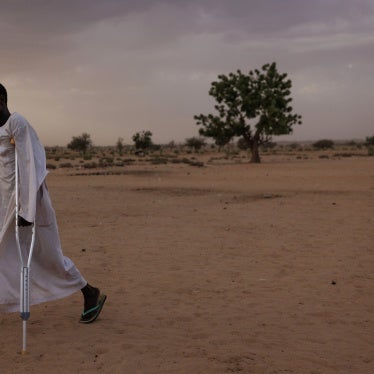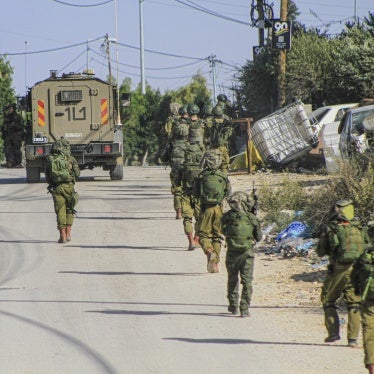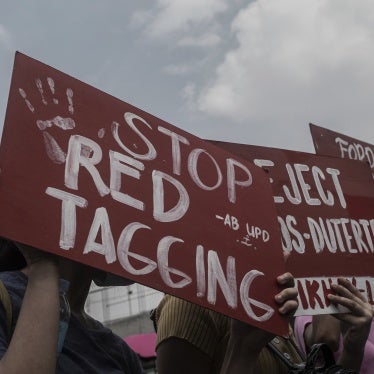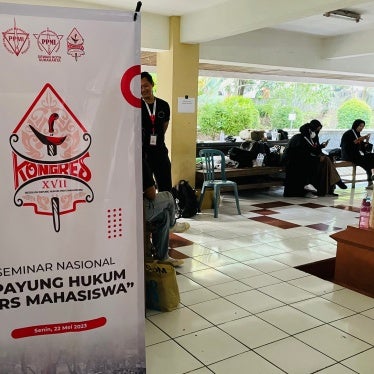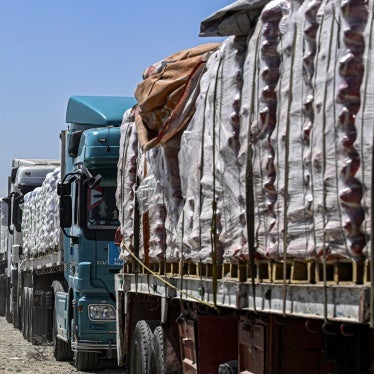In a report released today, Transition or Travesty? Nigeria's Endless Process of Transition to Civilian Rule, Human Rights Watch calls for Nigeria to be expelled from the Commonwealth, on the grounds that it has failed to meet the conditions set for membership by the Commonwealth Heads of Government in the Harare Declaration of 1991, and the Millbrook Action Programme of 1995.
The report is released to coincide with the first day of the Commonwealth Heads of Government Meeting in Edinburgh, at which Nigeria's suspension from the Commonwealth since 1995 is due to be reconsidered.
"The transition program put in place by General Abacha is a sham," said Peter Takirambudde, executive director of Human Rights Watch/Africa. "The Commonwealth should not be fooled into believing that the Nigerian military is serious about its promise to hand over power to a civilian government. Nigeria has not taken any of the steps to avoid expulsion stipulated by the Commonwealth Heads of Government in 1995 when it was suspended from membership, and accordingly should be expelled."
Human Rights Watch further calls on the Commonwealth to extend the mandate of the Commonwealth Ministerial Action Group (CMAG) and instruct CMAG to develop clear standards for the fulfillment of the principles of the Harare Declaration, which commits Commonwealth members to democratic political processes and respect for human rights and the rule of law. Human Rights Watch urges the international community to make clear to the Nigerian military regime that any transition program for the restoration of civilian government must fulfil certain minimum criteria before it can be deemed credible.
These minimum standards must include:
- the creation of a genuinely independent electoral commission and the development of an open and fair process for the registration of political parties and candidates;
- the release of all political prisoners;
- the repeal of the most repressive military decrees and respect for freedom of expression and the media.
Transition or Travesty? examines the progress made by Nigeria in restoring civilian rule and respecting human rights during the two years since it was suspended from the Commonwealth. Human Rights Watch concludes that General Abacha has manipulated every aspect of the current transition program to ensure the success of his supporters, and perhaps even his own election as a "civilian" president. The March 15, 1997 local government council elections, the most recent step in the transition process, were anything but free and fair. Many political prisoners held by the government in November 1995 remain incarcerated, including Chief Moshood K.O. Abiola, presumed winner of the June 12, 1993 presidential elections. Human rights and pro-democracy activists, trade union leaders and outspoken journalists are harassed, arrested and detained, generally without charges, for prolonged periods. Nigerians having realized that the transition process is a sham, and facing an economy paralyzed by fuel shortages, macroeconomic mismanagement and preoccupied with providing for their families' basic needs, have abandoned hope that the transition program will make any difference to their lives.
As Emeka Anyaoku, Secretary General of the Commonwealth, said at a conference on Commonwealth human rights institutions in London on October 16, 1997, "Nigeria has continued to assure us that it is attentive, but we are now waiting for action, not words."
Over the last two years, international criticism of Nigeria has become more muted. While sanctions imposed in 1993 and 1995 remain in place, governments have proved reluctant to take further concrete steps to show their disapproval of the military government. Human rights activists in Nigeria, however, are convinced as is Human Rights Watch that the situation in Nigeria would be far worse if these sanctions had not been imposed. Nigeria's international isolation should be maintained pending the installation of a civilian government elected following a genuinely free and fair transition program.
